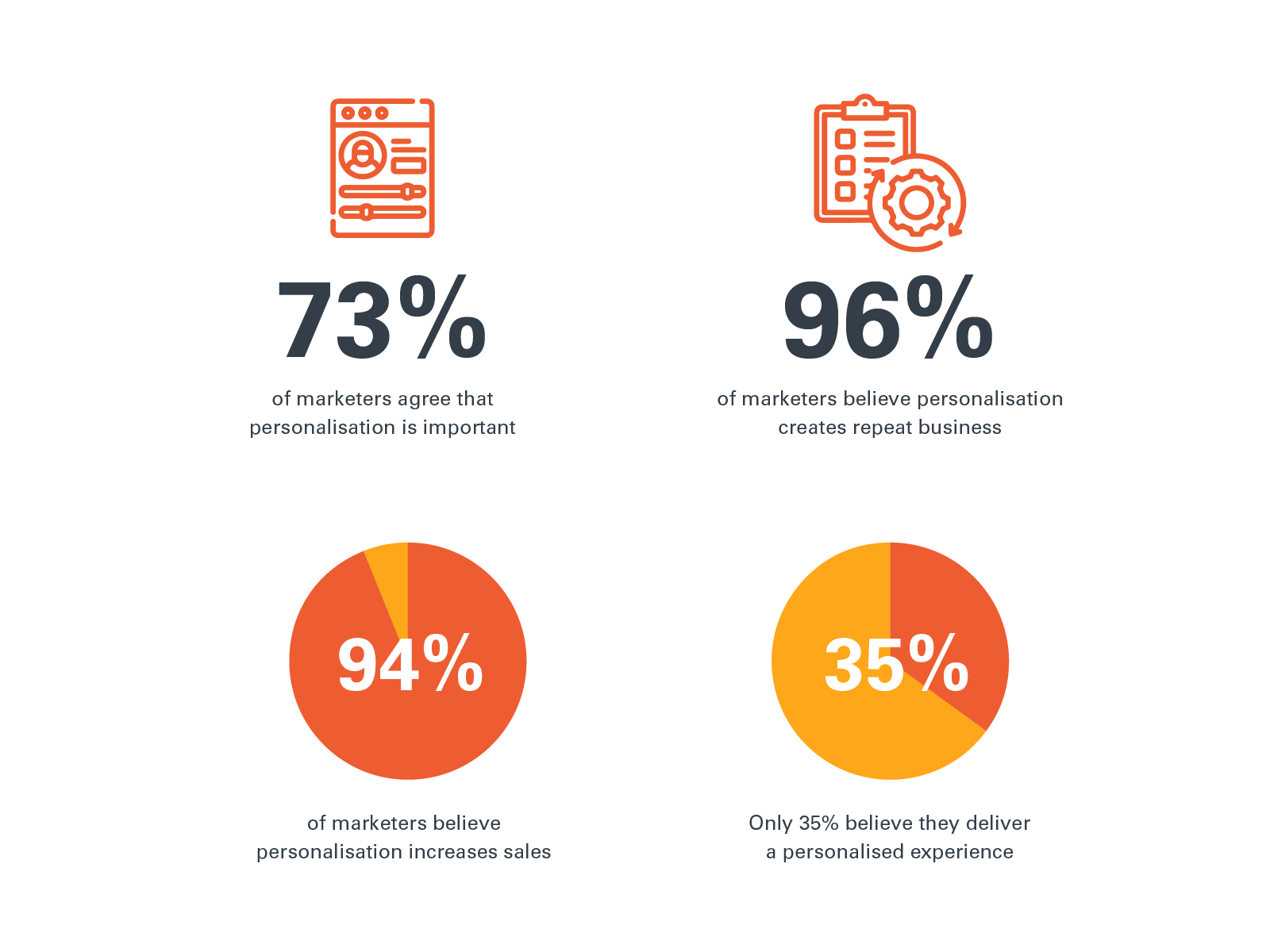Hubspot's latest State of Marketing report found that 73% of marketers acknowledge personalisation as important. Yet, only 35% believe they successfully deliver a truly personalised experience to their customers.
Time-consuming, wasteful processes in creating and adjusting content have contributed to this gap and made it difficult for teams to personalise content at scale. If you see this problem within your organisation, you need a new approach to content creation. Modular content offers a solution to dynamically adjust and tailor content to meet customer preferences and behaviours.
A modular approach to creating and managing content offers more than improved processes. That same Hubspot report found that 94% of marketers believe personalisation generates increased sales, and 96% see it leading to repeat business. So, personalisation is not only good for your internal team, but it also supports your bottom line.

Source: Hubspot.
Tailor customer experiences
Modular content enables marketing and content teams to mix and match pre-approved content elements such as images, videos, and text snippets. Teams can quickly adapt content to match customer preferences and behaviours to create tailored experiences that engage the target audience. Modularisation supports quick updates to reflect new product information or promotional messages, enhancing content relevancy and user engagement without rewriting and adjusting all of the content before publishing.
Adapt to specific channels
Modular content enables marketing teams to customise content layout, language and presentation to align with the unique requirements of various platforms. This adaptability ensures that content fits each channel's technical specifications and meets the audience's expectations.
For example, marketing teams can take a long-form article intended for desktop viewing and segment it into smaller, digestible pieces personalised for users accessing the website on a mobile phone. This approach enhances the user experience on mobile devices, where screen size dictates the need for concise, easily navigable content.

Bring efficiency to personalisation
Modular content makes it much easier to manage personalised content. Storing content components in a central repository and structuring and tagging it to suit each persona makes updating individual modules a straightforward task and eliminates the need to recreate every iteration of content required for a campaign.
Modular content enables quick adaptation across multiple channels, maintaining consistency in messaging and branding without the bottleneck of waiting for extensive updates from digital operations teams. The agility offered by modular content ensures that teams can personalise content as needed and make quick adjustments that align with market changes and user expectations.
Additionally, the efficiency gained through the automated delivery of modular content translates into more dynamic personalisation opportunities. With the ability to quickly update and customise content modules, marketing teams can tailor their communications to meet their audience segments' specific needs and preferences. This level of responsiveness enhances user engagement and significantly improves the overall effectiveness of personalised marketing strategies.

Deliver data-driven personalisation
Modular content, combined with headless content delivery, becomes a powerful tool for delivering personalised experiences based on data. For example, your team can customise a modular piece of outdoor gear with different images and text depending on whether the customer is a camper or a hiker. Additionally, modular content can adapt to different languages, allowing the same content to suit different countries and cultural contexts, broadening its appeal to a global audience.
Expand personalisation to new channels
Your organisation's ability to expand into new channels can become a competitive edge. Hubspot’s State of Marketing report placed Facebook, Instagram, YouTube and TikTok as the top four channels that resulted in the biggest ROI. Even if you only focus your content efforts on two channels, you double the work needed to post the same content on both without modularisation. With your audience's attention often spread across more than one channel, you need the ability to adapt content for new channels quickly.
Modularisation lays the groundwork for extending personalisation efforts into new channels and markets with reduced effort in content creation. Reusing and reconfiguring content modules enables marketing teams to quickly tailor content for different platforms or regions without starting from scratch. This capability accelerates the process of entering new markets or adopting emerging channels, making it a strategic asset for businesses aiming for growth and diversification.
Furthermore, the modular approach supports the consistent evolution of a brand's digital footprint. Marketing and content teams can align the messaging across all touchpoints, regardless of the channel or market. This consistency is crucial for building audience trust and recognition.

Experiment with A/B testing
Modular content makes it easier to run A/B tests. Marketers can simply swap out images, text, or calls to action within content to see which variations perform best. By experimenting with various combinations of content modules, marketing and content teams can directly measure the impact of different elements on audience engagement.
Systematically testing content allows teams to identify what resonates most with the target audience, providing valuable insights for fine-tuning personalisation efforts. This data-driven approach to personalisation means that marketing and content teams no longer work based on assumptions but on proven user preferences and behaviours.

Conclusion
Modular content supports personalisation by allowing marketing and content teams to optimise content for different channels and audience segments. Modularising content is the foundation for maximising the capabilities of omnichannel content platforms and headless content delivery for personalisation. By creating reusable content modules and combining them intelligently based on data, you can achieve a level of content personalisation that is deeply engaging for your audience.
Creative Folks can support your content strategy
We have over two decades of experience transforming content creation and delivery. Our experts have successfully implemented omnichannel content platforms for organisations such as Jetstar Airways, Rawson Group, The Australian Ballet, the University of Western Australia, and the Department of Industry, Science and Resources.
We go beyond simply deploying a one-size-fits-all solution. We work closely with you to understand your specific content management needs and significantly reduce the manual workload for your marketing and content teams. Visit our Sitecore Content Hub page for more insights into how we build modular content strategies.
Related blogs
From chaos to clarity: How to define your content production process
What role does content management play in business process transformation?
5 ways a headless CMS supports omnichannel delivery




 Previous
Previous



